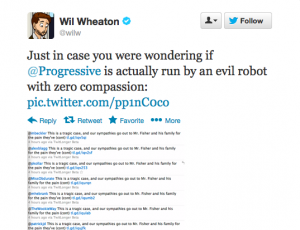Responding to crises is never easy, whether you’re a person who screwed up or a brand caught up in a scandal. When a crisis spills over onto social media, you can use it to your advantage or inadvertently fuel the flames. Below are three examples of the latter, each showing how bad social media crisis management had damning effects on major corporations.
1. Delete Facebook Comments
Prominent companies like Apple, United Airlines, and Walmart have recently come under fire for deleting comments from upset customers on their Facebook pages. While it’s understandable to want your brand’s Facebook page to be a positive representation of you/your brand, that does not automatically make it advisable to delete any negative or critical comments. While a good social media policy can help a company decide which comments are inflammatory or generally offensive enough to delete, those that are civil should not be dealt with this way.
Consider the consequences of silencing your audience. If you do delete comments, you’re not removing them from the conversation, but simply moving them elsewhere. Once the commenters catch wise to the situation, they’ll be even more inflamed, and will lash out on their own pages or those of others. Further, beyond a certain point, the comments may outpace the brand’s ability to delete them.
Solution: Treat critical comments as a PR exercise, or what Scott Hepburn from Media Emerging calls a customer service opportunity. Address the person’s concerns and needs, and if it’s a service complaint, do everything possible to solve the problem. Then post once the situation is resolved. If responding to en masse comments, make a status update that genuinely
2. Automate
Nobody likes receiving those automated out-of-office emails. The same tactic goes from obnoxious to downright offensive in the context of a PR crisis. Possibly the gravest example of this from recent history were the robotic Tweets from Progressive Insurance’s Twitter account responding to criticism for defending the driver who had killed one of their policy holders in an accident in court. The tweets were even lengthened through a 3rd party app, and were sent so many times that the company essentially spammed their followers with robotic-sounding content. These multiple breaches of twitter etiquette made users question Progressive’s sincerity and ultimately damaged the company’s online reputation.
Dozens of enraged and offended people tweeted their ire back to Progressive. Culture icon and actor Will Wheaton also called them “inhuman monsters” in a soundfile with an automated computer voice posted to his account’s thousands of followers.
Solution: Give anything with this much emotional gravity the attention and concern it deserves. Take the time to actually address the concerns and complaints of your friends and followers. If you’re going to use a medium, be sure to use it correctly. On Twitter, this means sticking to the character limit (linking a statement would have been far wiser). Never, ever spam, regardless of medium. Social media fails are more than just a PR crisis; bad rhetorical choices online quickly translate into a bad reputation in real life.
3. Lie
Recently, Applebee’s entered the depths of social media hell after not only made the first two mistakes mentioned here–deleting comments and automating responses–but proceeded to actually lie about their actions after the fact and engaged in a sloppy, half-hearted cover-up. Yes, after both deleting thousands of comments and literally spamming complaining customers by copy-pasting the exact same explanatory message (and even tagging individual people), the company lied about deleting said comments.
Which, of course, invited the wrath of the 20,000+ commenters from the previous day:

Unfortunately, the best possible solution here is to not lie in the first place. Avoid deception at all costs, because between throngs of enraged customers and screenshots, you will get caught. And you might get exposed in a tell-all visual essay, like the one above. Tools like the Wayback Machine make it easy for literally anyone to prove if you’ve changed your personal or corporate page to cover up a lie. So in the internet age, deception is not only difficult but not worth the trouble.



One Response to Social Media Fails: How To Take Your Online Crisis from the Frying Pan to the Fire